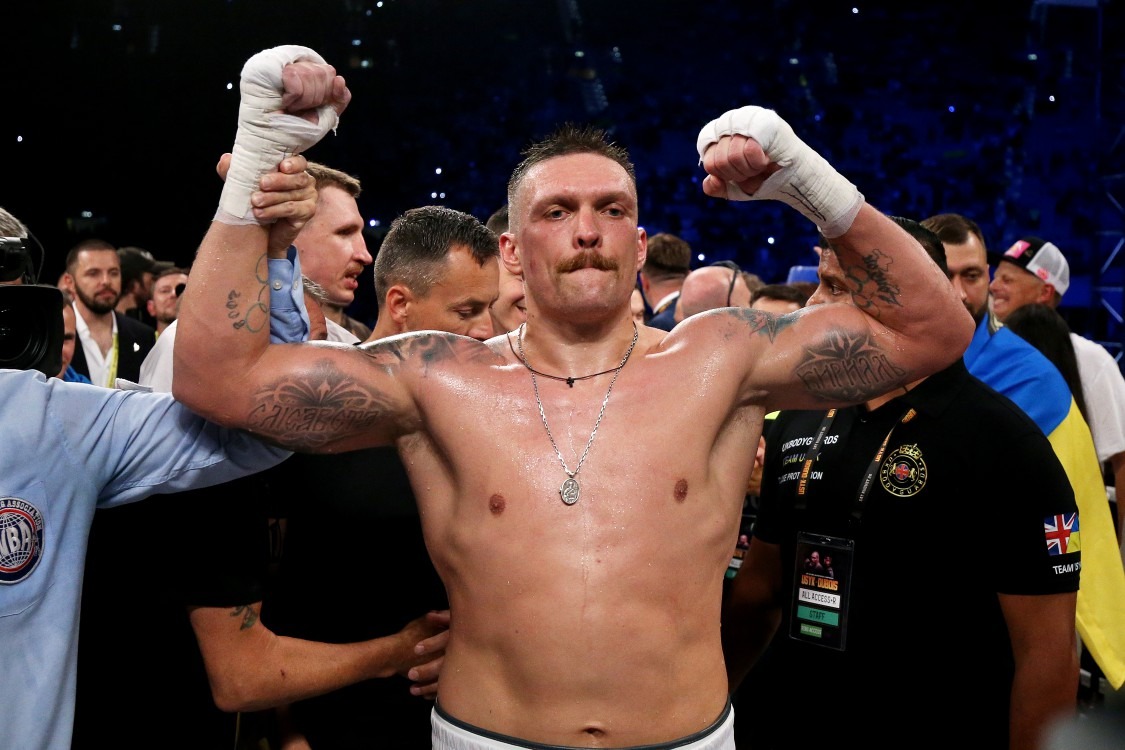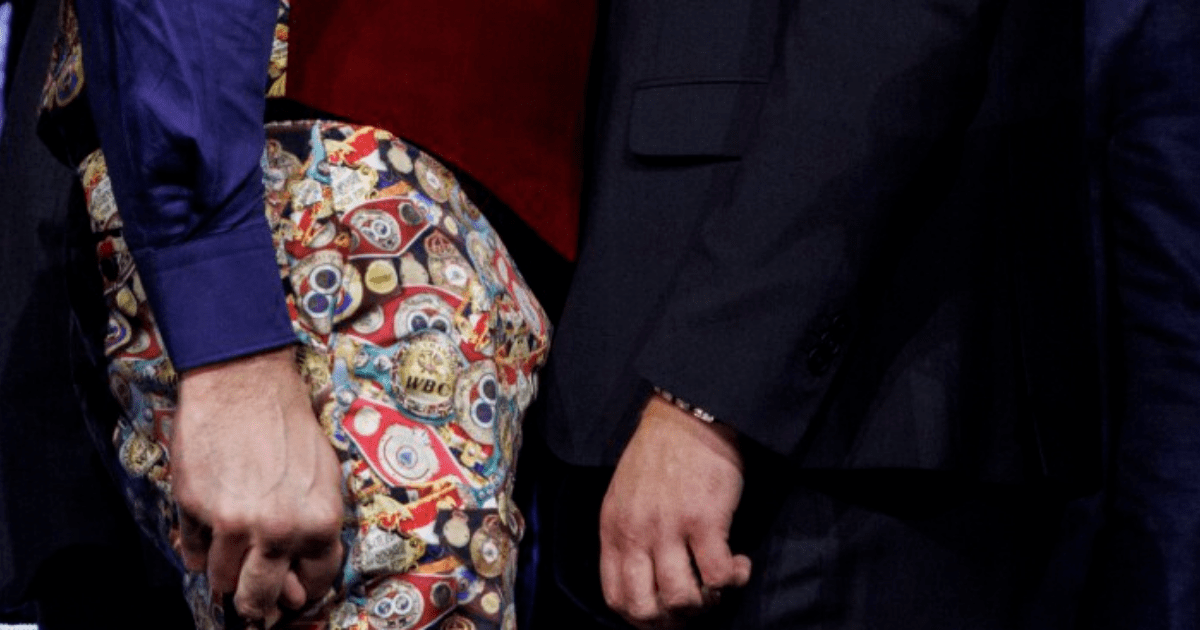Heavyweight Clash
Tyson Fury's quest for undisputed glory could be derailed if he underestimates his opponent, Oleksandr Usyk, according to heavyweight contender Zhilei Zhang. The two heavyweight giants will go head-to-head next month in a highly-anticipated title fight, with Fury aiming to become the first undisputed champion in 25 years.
Size Difference
Many have dismissed Usyk's chances of unifying the division, citing the significant size difference between the Ukrainian and Fury. However, Zhang believes that Usyk's unique skillset could cause a major upset in the upcoming clash.
Wake-up Call
Zhang points to Fury's previous fight against former UFC champ Francis Ngannou as a wake-up call. He warns that if Fury does not prepare properly and underestimates Usyk, he could be in serious trouble.
Skills Pay the Bills
Zhang is leaning towards Usyk winning the fight, emphasizing that skills and dedication are the keys to success in the sport of boxing.

Fury's Confidence
Despite the challenges he expects from Usyk, Fury is confident in his ability to emerge victorious and secure his place as the undisputed champion. He believes that Usyk will struggle against the bigger opponents he has faced in the past, and he is determined to break his opponent in the upcoming bout.
The Battle for Undisputed Glory
The clash between Tyson Fury and Oleksandr Usyk is shaping up to be a fight for the ages. Both fighters are determined to cement their legacies, but only one can emerge as the undisputed champion. Boxing fans around the world eagerly await the showdown, which is set to take place in Saudi Arabia on February 17.
Frequently Asked Questions
What is the basic training program of a Boxer?
A boxer’s routine is made up of several main components. They include technical skill building, tactical drills and strength and conditioning. Sparring and mental training are also included. Tactics drills help develop fighting strategies, while technique-focused exercises improve defensive maneuvers and punch accuracy. Conditioning exercises enhance athleticism, and sparring provides practical fight experience. Mental training emphasizes confidence, focus, and resilience.
What are the risks associated with professional boxing?
Like any contact sport, professional boxing is not without its risks. They include acute injuries, such as cuts and bruises, broken bone, head trauma, and potential chronic conditions caused by repeated impacts, such concussion syndromes, or neurological disorders. Although boxing regulations and safety equipment can help to reduce risk, it is impossible to eliminate them completely. Understanding and accepting these risks is a critical part of choosing to box professionally.
Can anyone learn to box professionally?
Even though boxing may be accessible to all, not everyone is cut out to compete professionally. Professional boxing demands a unique combination of talent as well as physical abilities, mental strength and dedication. The sport has inherent risks that potential boxers will have to be willing and able to take. A thorough assessment by a coach can determine if a person has the potential to make a career out of boxing.
What should a potential boxing trainer or coach look like?
In choosing a boxing instructor or coach, you should consider their experience, track record, coaching style compatibility, and understanding of technical and tactical aspects. A good coach will also stress safety, conditioning and personal growth. To reach your boxing potential, you need a coach who is able to motivate and communicate well.
What is required for a professional boxer to begin?
Essential equipment for anyone who wants to start in professional boxing includes boxing glove, hand wraps and mouthguard (for sparring). Also included are proper footwear. Technical workouts require a heavy bag or speed bag as well as a double-end, double-end, or other training aids. Quality equipment is important for safety and durability. Subpar gear increases the risk of injury.
Are there age restrictions for learning to box professionally?
Professional boxing does have age restrictions. Most boxing commissions insist that boxers must be 18 or older in order to fight professionally. Although there is not a set age limit for the upper age bracket, factors like physical capability and health will naturally limit what age one can safely and effectively compete. Prior to taking up professional sports, it’s important for older athletes be evaluated thoroughly for fitness and safety.
What roles do managers and promoters play in a boxer’s professional career?
Promoters and managers have a major role to play in a fighter’s professional life. Managers manage the career of boxers, negotiate contracts, and take care of their business affairs. The managers also help the boxer to choose the best fights, and look after his interests. Promoters focus their efforts on organizing events, marketing the fights, and attracting sponsor and audience attention.
Statistics
- On average, a professional boxer spars between 100 to 200 rounds in preparation for a major fight.
- Approximately 80% of professional boxers start their career in the amateur ranks before transitioning to the professional level.
- A study showed that most professional boxers have spent more than 4 years in training before their first professional bout.
- Reports suggest that successful professional boxers can earn upwards of 50 times more than the median purse for entry-level professionals per fight.
- Around 60% of professional boxers supplement their income with other activities or jobs, due to variability in fight earnings.
- Professional boxers typically train 4 to 6 hours per day, 5 to 6 days a week, depending on their fight schedule.
- The average age for boxers to turn professional is between 18 to 25 years, though many continue to compete well into their 30s and beyond.
External Links
wbcboxing.com
boxingnews24.com
expertboxing.com
usaboxing.org
boxingscene.com
teamusa.org
sweetsciencefitness.com
How To
How to Cut Weight for a Boxing Fight
It is important to be disciplined when managing your weight in advance of a fight. Establish a nutrition plan that focuses on lean proteins, complex carbohydrates, and hydration while cutting back on high-sodium and high-fat foods. It is possible to manipulate the water weight of your body by increasing and decreasing water consumption a few weeks ahead of the fight. If necessary, incorporate sauna sessions and increase your workout intensity to lose extra pounds. Avoid drastic weight loss techniques and always prioritise safety.

